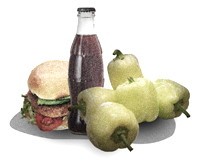Olympic speed skater J.R. Celski discusses his diet for success
Having a healthy relationship with your body is fundamental for ensuring long-term good health. For U.S. Olympic short track speed skater J.R. Celski, this relationship has been an essential part to his success as a professional athlete.
“[When it comes to nutrition,] I look to my dad,” Celski said in a phone interview earlier this month.
Celski’s father has taken an avid interest in his nutrition plan, which is based around a high quantity of whole foods. This includes a variety of vegetables, fruit, lean meats, rice and potatoes, in addition to protein shakes.
Keeping ourselves energized throughout the day is only possible through constant refuelling and re-hydration.
Celski is a strong advocate for eating a proper breakfast and for eating frequently throughout the day when his body tells him it needs nourishment. Listening to his body enables Celski to keep in peak condition and maintain muscle mass by providing it with the nutrients it needs.
Maintaining a strong immune system is just as important as building muscles.
“I try to stay away from processed foods because I know they’re not good for my body. Eating them is one way that you can get sick,” Celski said.
Ensuring that his body is always sufficiently fuelled, basic foods, such as apples, are his choice for a quick snack mid-workout.
After being seriously injured on the ice and undergoing surgery, Celski is adamant that the recovery process is just as important as his strict training regime. Although he typically trains six days a week, the speed skater takes breaks when he knows he needs them.
Sleeping a solid eight hours a night is crucial to building a strong immune system, so the young athlete is dedicated to his consistent schedule.
Keenly aware of the benefits of a positive support system, Celski spoke throughout the interview in terms of we: he views himself and the other athletes that he trains with daily as a collective.
“The main thing for all athletes is, don’t get sick!” Celski said, showing just as much concern for the others on the ice as for his own well-being.
When discussing the teams that he will be up against in the 2010 Vancouver Olympic Games, Celski’s admiration and respect for them was clear as he listed several of the Canadian speed skaters that he has faced in the past as some of his toughest opponents. His tone suggested camaraderie amongst everyone who identifies as an athlete, no matter which country they are representing in Vancouver.
The athletes performing in the Olympic Games are living proof that their talent and skill in competitions is highly dependant on their interactions with others and how well they care for their bodies – and that’s something that we can all emulate, regardless of whether we are world-class athletes or watching sports from the comfort of our living rooms.
University of Winnipeg student Sagan Morrow writes a health and wellness blog.
Published in Volume 64, Number 19 of The Uniter (February 11, 2010)







